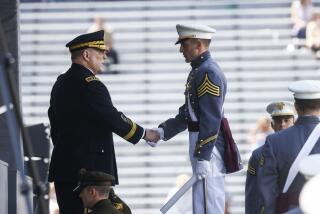Ex-NATO General Urges U.S-Soviet Force
- Share via
LONDON — Gen. Sir John Hackett, whose chilling vision of World War III was published more than a decade ago, now calls for U.S.-Soviet military cooperation to prevent a nuclear Armageddon.
One of the world’s leading scholar-soldiers, Hackett said a superpower clash originating in Europe is far less likely than it had been since 1945 because of nuclear deterrence and is more likely to be sparked by regional conflicts.
Superpower cooperation would reduce the prospect of such conflicts, he believes.
“They ought to know the Sixth Fleet would be there overnight with two Russian airborne divisions handy at the drop of a hat to say, ‘Stop it you stupid people or you’re for the high jump,’ ” Hackett said in an interview.
In Hackett’s 1978 book “The Third World War” Moscow fires a nuclear missile at Birmingham, England, prompting a nuclear salvo at Minsk. The attack provokes uprisings in some Soviet republics, the leadership is overthrown and the war ends.
“The problem for me then was, do we want to see this giant (the Soviet Union) disintegrate, and I wrote books around the prospect that it would be a good thing if it did. But since then I’ve rather wondered.”
His vision now is of East and West working together.
“The Iran-Iraq war was a perfect example of what I had in mind. This was a great opportunity for the U.S. and the U.S.S.R. to come together and control it. . . . We only got out of it without a major disaster because neither had advanced nuclear weaponry.”
Secret contingency plans would swing into operation if a regional war looked as if it could jeopardize world security.
Hackett, who was commander-in-chief British Army of the Rhine and commander Northern Army Group (NATO), said it had always been a “nice fantasy” of his to conduct joint superpower exercises to avoid conflict.
The United States and the Soviet Union could be seen as a Gothic arch. “If one side of the arch disintegrates you’ve got an untidy mess of rubble,” Hackett said.
A world in which two superpowers are opposed but in rough parity of offensive capability makes for a more stable situation than if one collapses, he said, adding the West should continue to help the Soviet Union with food, technology and reassurance.
“We don’t want to pull the rug from under (Soviet leader Mikhail) Gorbachev’s feet.”
Nuclear arsenals were largely responsible for keeping Europe war-free, said Hackett who was highly decorated and wounded three times in World War II.
“Since 1945 there have been 73 identifiable wars in which some 40 million died. No one has died in Europe (since 1945) as the result of war,” Hackett said.
A committed pro-nuclear weapons campaigner, Hackett’s formidable intellect finds pacifism unrealistic. “Bless their naive childish souls,” said the general in his old-school accent.
The 79-year-old general, a short, stockily built man who worked with the Parachute Regiment and the Special Air Service, studied classics at Oxford and has also been principal of London University’s King’s College.
Hackett said the West should ignore calls for troop cuts in Europe after sweeping changes in the Warsaw Pact countries.
“People who are arguing this are like those who choose the design on the wallpaper before the house has been built.”
Several years are needed to see what political structures emerge from the wave of reform before deciding what to do with Western forces, he said. “What needs to happen now in the defense sphere is nothing.”
He warned against the reunification of Germany and said a united Germany could present great dangers to European stability. “I don’t want to see it happen,” he said.
Conventional warfare is by no means obsolete. “What we have to do is put nuclear warfare on the shelf and keep it there.”
He is wary about arms negotiations.
“All this negotiating about numbers of warheads is nonsense,” he said. “It isn’t the numbers of warheads that matters.
“You reduce the strategic capability on both sides by 50%; each still has 10 times what is necessary to destroy the other. It isn’t numbers of warheads; it isn’t degree of armaments that cause wars. What causes wars is political outlook.”
More to Read
Get the L.A. Times Politics newsletter
Deeply reported insights into legislation, politics and policy from Sacramento, Washington and beyond. In your inbox twice per week.
You may occasionally receive promotional content from the Los Angeles Times.









